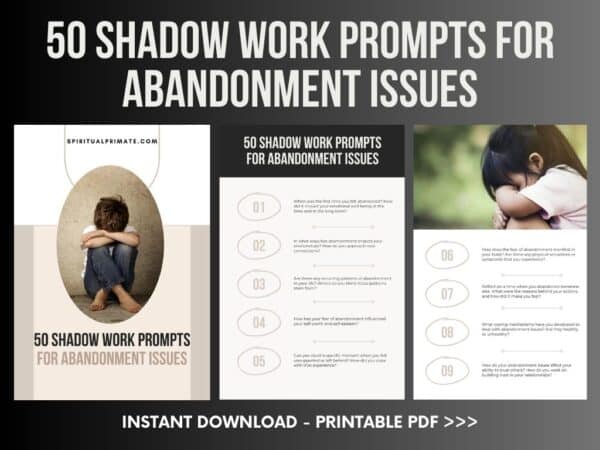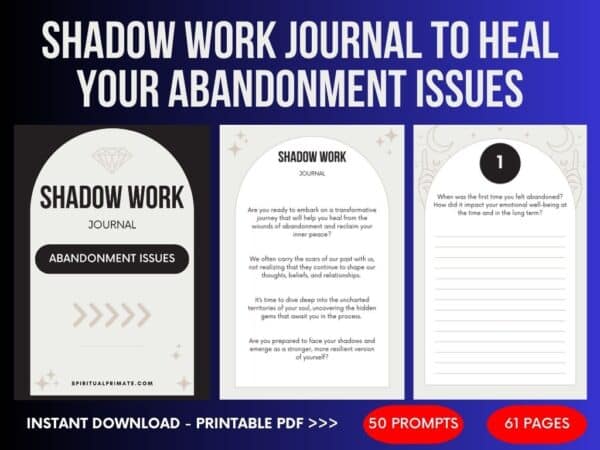Are you ready to embark on a transformative journey that will help you heal from the wounds of abandonment and reclaim your inner peace?
We often carry the scars of our past with us, not realizing that they continue to shape our thoughts, beliefs, and relationships. It’s time to dive deep into the uncharted territories of your soul, uncovering the hidden gems that await you in the process. In this thought-provoking guide, we present “50 Soul-Stirring Shadow Work Prompts to Heal Your Abandonment Issues and Unlock Emotional Freedom.”
Are you prepared to face your shadows and emerge as a stronger, more resilient version of yourself?

Abandonment: Understanding Emotional Desertion
Once upon a time, in the vast landscape of human emotions, there resided a feeling that often tiptoed into our hearts and left us feeling lost and alone. This feeling was called abandonment.
Abandonment is when someone we love or rely on leaves us without warning or explanation. It can happen in many forms, like a parent leaving a child, a friend ghosting us, or a partner breaking up with us.
When we experience abandonment, it can feel like our world has been turned upside down. We might feel sad, confused, or even angry. It’s important to remember that it’s okay to feel these emotions. It’s a natural response to a difficult situation.
However, it’s also important to remember that abandonment is not our fault. It’s not a reflection of our worth or ability to be loved. It’s simply a decision that someone else made.
If you’re struggling with feelings of abandonment, it’s important to reach out for help. Talk to a trusted friend or family member, or seek professional support. Remember that you are not alone and that there are people who care about you.
In the end, abandonment might be a part of our story, but it doesn’t have to define us. We can choose to move forward and find happiness, even in the midst of our pain. So hold on, dear friend, and know that the sun will shine again.

How Shadow Work Can Help With Abandonment Issues
In the realm of psychology, shadow work is like the fairy godmother that can grant our deepest wishes for healing and self-discovery. It is a transformative process, where we bravely venture into the darkest corners of our minds to confront and integrate the parts of ourselves we’ve disowned. For those of us grappling with abandonment issues, shadow work offers a powerful way to uncover the roots of these feelings and learn to nurture our authentic selves.
The first step of our enchanting journey is to recognize the existence of our abandoned parts. These are the feelings, beliefs, and experiences that have been locked away in the dungeons of our subconscious. Like the heroes of a fairy tale, we must bravely venture into these dark realms in search of our lost selves. With each step, we may encounter fearsome dragons and wicked witches, but we must remember that they are merely guardians of our true selves, waiting to be vanquished and transformed.
As we forge ahead, we may stumble upon magical tools to aid us in our quest. These are the shadow work prompts that can help us break the spell of abandonment. Some of these prompts might include journaling exercises, guided meditations, and therapeutic conversations that encourage us to delve deep into our emotional histories. By engaging with these prompts, we can begin to understand the origins of our abandonment issues and the ways they have shaped our lives.
In time, our fears and doubts will give way to understanding and acceptance. As we come to know our shadow selves, we will uncover the hidden gifts and talents that lie dormant within us. The process of integrating these abandoned parts of ourselves can be both challenging and rewarding, requiring us to confront our vulnerabilities with courage and compassion. But with each victory, we will grow stronger and more resilient, like a phoenix rising from the ashes.
Our journey through the realm of shadow work will not always be easy, but it is an essential part of our path to healing and self-discovery. By embracing our abandoned selves and integrating our shadows, we can learn to love ourselves more deeply and cultivate a greater sense of self-worth. As we emerge from the shadows and into the light, we will be transformed, like a caterpillar becoming a beautiful butterfly.
So let us embark on this magical adventure, dear reader, and remember that we are not alone in our quest to heal abandonment issues through shadow work. With the help of our fairy godmother, we can face our fears, discover our true selves, and create a more authentic and fulfilling life. And like the heroes of our favorite fairy tales, we will emerge from our journey transformed, triumphant, and ready to live happily ever after.

Shadow Work Prompts for Abandonment Issues
1. When was the first time you felt abandoned? How did it impact your emotional well-being at the time and in the long term?
2. In what ways has abandonment shaped your relationships? How do you approach new connections?
3. Are there any recurring patterns of abandonment in your life? Where do you think these patterns stem from?
4. How has your fear of abandonment influenced your self-worth and self-esteem?
5. Can you recall a specific moment when you felt unsupported or left behind? How did you cope with that experience?
6. How does the fear of abandonment manifest in your body? Are there any physical sensations or symptoms that you experience?
7. Reflect on a time when you abandoned someone else. What were the reasons behind your actions, and how did it make you feel?
8. What coping mechanisms have you developed to deal with abandonment issues? Are they healthy or unhealthy?
9. How do your abandonment issues affect your ability to trust others? How do you work on building trust in your relationships?
10. How do you communicate your feelings of abandonment to the people in your life? Are there any barriers that prevent open communication?
11. How do you define “abandonment”? Does your definition differ from the way others might perceive it?
12. What role does forgiveness play in healing your abandonment issues? Have you forgiven those who have abandoned you, as well as yourself?
13. How does your fear of abandonment influence your decision-making process in various aspects of your life?
14. Are there positive aspects or growth opportunities that have arisen from your experiences with abandonment?
15. If you could speak to your younger self who felt abandoned, what words of wisdom or comfort would you offer?
16. How has abandonment impacted your ability to set and maintain boundaries in your relationships?
17. Do you believe that people with abandonment issues can form healthy, lasting relationships? Why or why not?
18. Can you identify any triggers that evoke feelings of abandonment in your life? How do you manage these triggers?
19. What role does self-care play in addressing your abandonment issues? What self-care practices help you feel supported and secure?
20. How do you differentiate between real abandonment and perceived abandonment in your life?
21. How has your inner child been affected by abandonment? What can you do to nurture and support your inner child?
22. Are there any beliefs or assumptions you hold about abandonment that may not be true or helpful?
23. How do your abandonment issues influence your attachment style in relationships?
24. What would it look like for you to fully heal from your abandonment issues? How would your life change?
25. How do you maintain your sense of self and personal identity in the face of abandonment?
26. Can you recall any instances when you felt undeserving of love or support? How did these feelings connect to your abandonment issues?
27. What resources, such as therapy or support groups, have you utilized to address your abandonment issues? How have they been helpful?
28. How do you differentiate between healthy and unhealthy relationships when it comes to abandonment?
29. What role does self-compassion play in healing your abandonment issues? How can you practice self-compassion more frequently?
30. How has your perception of abandonment evolved over time? Are there any shifts in understanding that have been particularly transformative?
31. Are there any spiritual practices or beliefs that have helped you cope with your abandonment issues?
32. How do you balance your need for independence and self-sufficiency with your fear of abandonment?
33. What role does gratitude play in healing your abandonment issues? How can you cultivate a practice of gratitude in your daily life?
34. Have you ever felt abandoned by a higher power or the universe? How did you come to terms with this experience?
35. What would it feel like to release the burden of your abandonment issues? How can you take steps toward this release?
36. How do you validate and honor your feelings of abandonment without allowing them to consume you?
37. Are there any creative outlets, such as writing or art, that have helped you process your abandonment issues?
38. How do your abandonment issues intersect with other aspects of your identity, such as your race, gender, or cultural background?
39. What role does empathy play in understanding and healing your abandonment issues?
40. How can you create a safe space for yourself and others to explore feelings of abandonment without judgment?
41. Are there any books, movies, or songs that have resonated with your experiences of abandonment?
42. What role do personal boundaries play in preventing feelings of abandonment in your relationships?
43. How can you be a source of support for others who may be experiencing abandonment issues?
44. What are some affirmations or mantras that help you feel grounded and secure when dealing with abandonment?
45. How does your perception of “home” and belonging relate to your abandonment issues?
46. What would it look like for you to reclaim your power and agency in the face of abandonment?
47. Are there any symbols or imagery that represent healing from abandonment for you?
48. How can you create a sense of stability and security within yourself, independent of external relationships?
49. What role does vulnerability play in addressing your abandonment issues and fostering deeper connections with others?
50. How can you honor and celebrate the resilience and growth that has emerged from your experiences with abandonment?
Congratulations on making it through these 50 soul-stirring shadow work prompts! By confronting your abandonment issues and self-reflecting, you’ve taken a brave step toward emotional freedom and self-empowerment.
Remember, healing is an ongoing journey, and it’s essential to be patient and compassionate with yourself as you continue to grow and evolve.
Now that you’ve delved into the depths of your psyche and begun healing from abandonment, what other areas of your life are calling for your attention? Are you ready to continue your journey of self-discovery and transformation?
Dive Deeper Into Your Shadow Work Journey
- Product on sale
 50 Shadow Work Prompts for Abandonment Issues | Printable PDFOriginal price was: $5.98.$2.99Current price is: $2.99.
50 Shadow Work Prompts for Abandonment Issues | Printable PDFOriginal price was: $5.98.$2.99Current price is: $2.99. - Product on sale
 Printable Shadow Work Journal to Heal Your Abandonment Issues [PDF]Original price was: $11.98.$5.99Current price is: $5.99.
Printable Shadow Work Journal to Heal Your Abandonment Issues [PDF]Original price was: $11.98.$5.99Current price is: $5.99.

